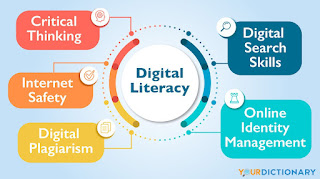Digital Literacy: The Essential Skill for the 21st Century
Introduction
In our increasingly digital world, the ability to use technology effectively and responsibly—known as digital literacy—has become as fundamental as reading and writing. From online learning to remote work, digital transactions to social media, digital literacy empowers individuals to navigate, evaluate, and create information safely and productively. This article explores what digital literacy means, why it matters, and how to develop it, along with five must-read books to master this crucial skill.
What is Digital Literacy?
Digital literacy goes beyond basic computer skills. It encompasses:
Technical proficiency (using devices, software, and online tools)
Information literacy (finding, evaluating, and using digital content responsibly)
Cybersecurity awareness (protecting personal data and recognizing online threats)
Communication skills (engaging ethically on social media and digital platforms)
Critical thinking (distinguishing credible sources from misinformation)
According to the American Library Association (ALA), digital literacy is "the ability to use information and communication technologies to find, evaluate, create, and communicate information, requiring both cognitive and technical skills."
Why is Digital Literacy Important?
1. Essential for Education & Employment
Schools and workplaces rely on digital tools (Google Classroom, Zoom, Slack, etc.).
Many jobs now require basic coding, data analysis, or digital marketing skills.
2. Safeguards Against Misinformation
Helps identify fake news, deepfakes, and AI-generated content.
Encourages fact-checking and responsible sharing.
3. Enhances Online Safety
Reduces risks of phishing, scams, and identity theft.
Teaches privacy settings and secure password practices.
4. Promotes Digital Citizenship
Encourages ethical behavior, empathy, and respectful online communication.
Combats cyberbullying and hate speech.
5. Bridges the Digital Divide
Empowers marginalized groups (seniors, low-income individuals) to access opportunities.
How to Improve Digital Literacy
1. Learn Basic Technical Skills
Master essential tools (email, cloud storage, video conferencing).
Take free courses (Google Digital Garage, Coursera, Khan Academy).
2. Practice Information Evaluation
Use the CRAAP Test (Currency, Relevance, Authority, Accuracy, Purpose) to assess sources.
Cross-check facts with Snopes, FactCheck.org, or official websites.
3. Strengthen Cybersecurity Habits
Use strong passwords and two-factor authentication.
Recognize phishing emails (check sender addresses, avoid suspicious links).
4. Engage in Ethical Digital Communication
Think before posting (avoid sharing private or harmful content).
Cite sources properly to avoid plagiarism.
5. Stay Updated on Tech Trends
Follow reputable tech news (Wired, MIT Technology Review).
Explore emerging topics (AI, blockchain, digital privacy laws).
Top 5 Books to Master Digital Literacy
1. Digital Literacy for Dummies – Faithe Wempen
Why Read It?
Covers basics like internet safety, social media, and productivity tools.
Ideal for beginners and seniors.
2. The Art of Invisibility – Kevin Mitnick
Why Read It?
Written by a former hacker, this book reveals how to protect your online identity.
Covers VPNs, encryption, and avoiding surveillance.
3. Weapons of Math Destruction – Cathy O’Neil
Why Read It?
Explores how algorithms and big data impact society (jobs, loans, policing).
Teaches critical thinking about AI and data bias.
4. A Citizen’s Guide to Fake News – Mark Dice
Why Read It?
Helps spot disinformation and media manipulation.
Includes real-world examples of propaganda.
5. Algorithms to Live By – Brian Christian & Tom Griffiths
Why Read It?
Explains how algorithms shape our digital lives (search results, recommendations).
Improves decision-making in tech-driven environments.
Conclusion
Digital literacy is no longer optional—it’s a survival skill in the modern world. By improving your ability to use, evaluate, and secure digital tools, you can unlock opportunities, stay safe online, and contribute thoughtfully to the digital ecosystem. Start with the books listed above, practice mindful tech habits, and keep learning as technology evolves.


Comments
Post a Comment